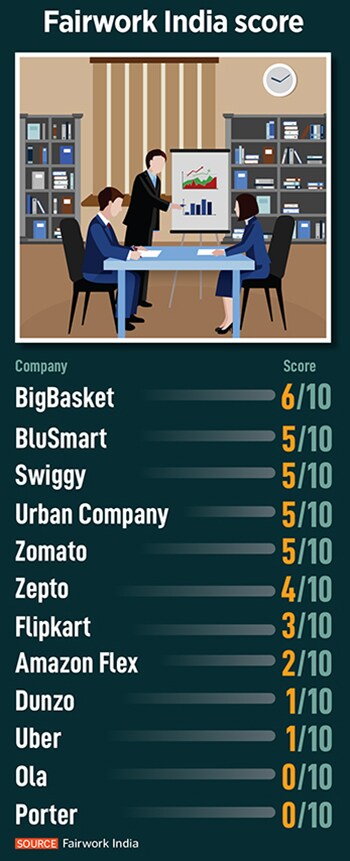Unfair pay, poor working conditions, and unresponsive management: From BigBasket
BigBasket is the best place for gig workers, while Ola and Porter are the worst, according to research by Fairwork India


Fairwork India studied and rated 12 large, gig platforms in India for their pay policies and working conditions. BluSmart, Swiggy, Urban Company and Zomato each scored a satisfactory 5 points in the ratings. Other platforms such as Zepto, Flipkart, Amazon Flex, Dunzo and Uber, scored below the average points.
Fairwork India, a collaborative research of Oxford University, International Institute of Information Technology, Bengaluru, and the Centre for Information Technology and Public Policy, releases its annual report on labour standards and platform economy. The research rated the platforms along five parameters: Fair pay, fair conditions, fair contracts, fair management and fair representation.
 Of the 12 platforms, only BigBasket, Flipkart and Urban Company performed well on the fair pay parameter. These are the only three companies that have a minimum wage policy. Other companies do not provide assurance to workers in any form for a minimum hourly, daily or monthly income.
Of the 12 platforms, only BigBasket, Flipkart and Urban Company performed well on the fair pay parameter. These are the only three companies that have a minimum wage policy. Other companies do not provide assurance to workers in any form for a minimum hourly, daily or monthly income.
Most companies, excluding Dunzo, Ola and Porter, performed well on the fair conditions parameter. These companies have provisions of assistance in emergencies such as accidents, theft, bad weather and other risks. BigBasket, Urban Company, Zepto, Swiggy, and Zomato provide gig workers with accidental and general health insurance.
For the fair contracts parameter, seven companies performed well on accessibility and transparency. These companies provided contracts that were clear, easily understandable and in regional languages. Furthermore, five of these seven companies provided a clause for prior notification for change in the terms of engagement.
BigBasket, Zomato, Flipkart, and Amazon Flex performed satisfactorily, while BluSmart and Swiggy performed better in fair management. These companies provided better channels for grievance redressal and appeals against disciplinary actions. In addition, the latter companies regularly conducted external audits of their algorithms to ensure zero discrimination and bias. Urban Company, Zepto, Dunzo, Uber, Ola and Porter failed on the fair management parameter due to untimely grievance redressal and company support.
Also report: How gig workers push back against their "digital boss"
For the fair representation parameter, which implies recognition of the workers" union/association by the platforms, all the platforms failed. Despite multiple protests by gig workers" associations in cities like Bengaluru, Mumbai, Delhi and Pune, none of the companies have recognised any workers" body.
According to a NITI Aayog report from 2020-21, there are 7.7 million platform-based gig workers in India, and by the end of 2030, the number will be about 23 million. Currently, they represent 1.5 percent of the total workforce of India and will increase to 6.7 percent of the entire workforce by 2030. Despite these vast numbers, the sector is still largely unorganised.
Gig workers have staged protests over the past few months for fair pay, employment security and better working conditions. A few states in India have taken steps in the direction of regulating the sector. The Rajasthan government has passed an act for the registration and welfare of these workers. It has provisions for the establishment of the Platform-Based Gig Workers Welfare Board. All the platforms, workers, and workers" associations must register with the board. This board will ensure that workers" rights are protected, and grievances settled in a timely manner. The Karnataka government has also rolled out the Karnataka State Gig Workers Insurance Scheme, which provides Rs 2 lakh for life and health insurance each for gig workers at the state"s expense.
Although the NITI Aayog report points out that gig work, with very low entry barriers, is democratising access to jobs to all sections of society, there is a need for better policies to organise the sector from the top. Furthermore, the platforms need to form better policies to create a sense of security among the workers and better management.
First Published: Oct 31, 2023, 15:50
Subscribe Now